Unit 25: Social Care Support Work - Roles of Non-Direct Workers Report
VerifiedAdded on 2020/07/22
|6
|1742
|74
Report
AI Summary
This report delves into the crucial roles of non-direct care workers within social care environments such as residential and nursing homes, focusing on their diverse responsibilities and required skills. It identifies roles including caterers, security officers, receptionists, gardeners, and cleaners, highlighting the importance of interpersonal skills like communication and active listening for effective patient interaction. The report emphasizes the significance of team operations, including clear objectives, confidentiality, and supervision for integrated service delivery. It also addresses the non-direct workers' role in maintaining a safe and hygienic caring environment through adherence to health and safety protocols, proper waste disposal, and the use of personal protective equipment. The report stresses the importance of supervision to ensure compliance with relevant legislation, such as the Health and Safety at Work Act, Data Protection Act, Food Act, and Care Standards Act, thereby safeguarding both workers and service users. References to relevant academic sources are included to support the analysis.
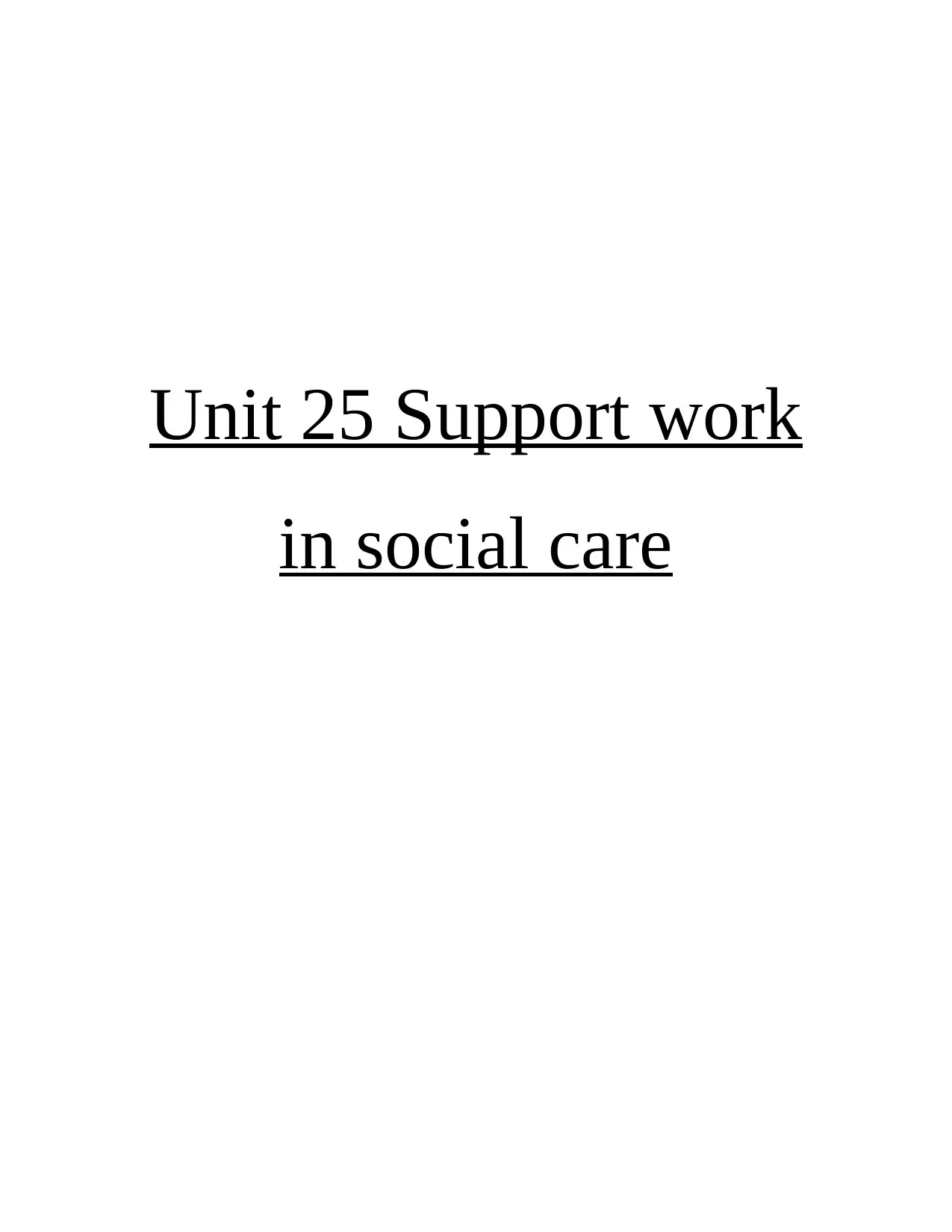
Unit 25 Support work
in social care
in social care
Paraphrase This Document
Need a fresh take? Get an instant paraphrase of this document with our AI Paraphraser
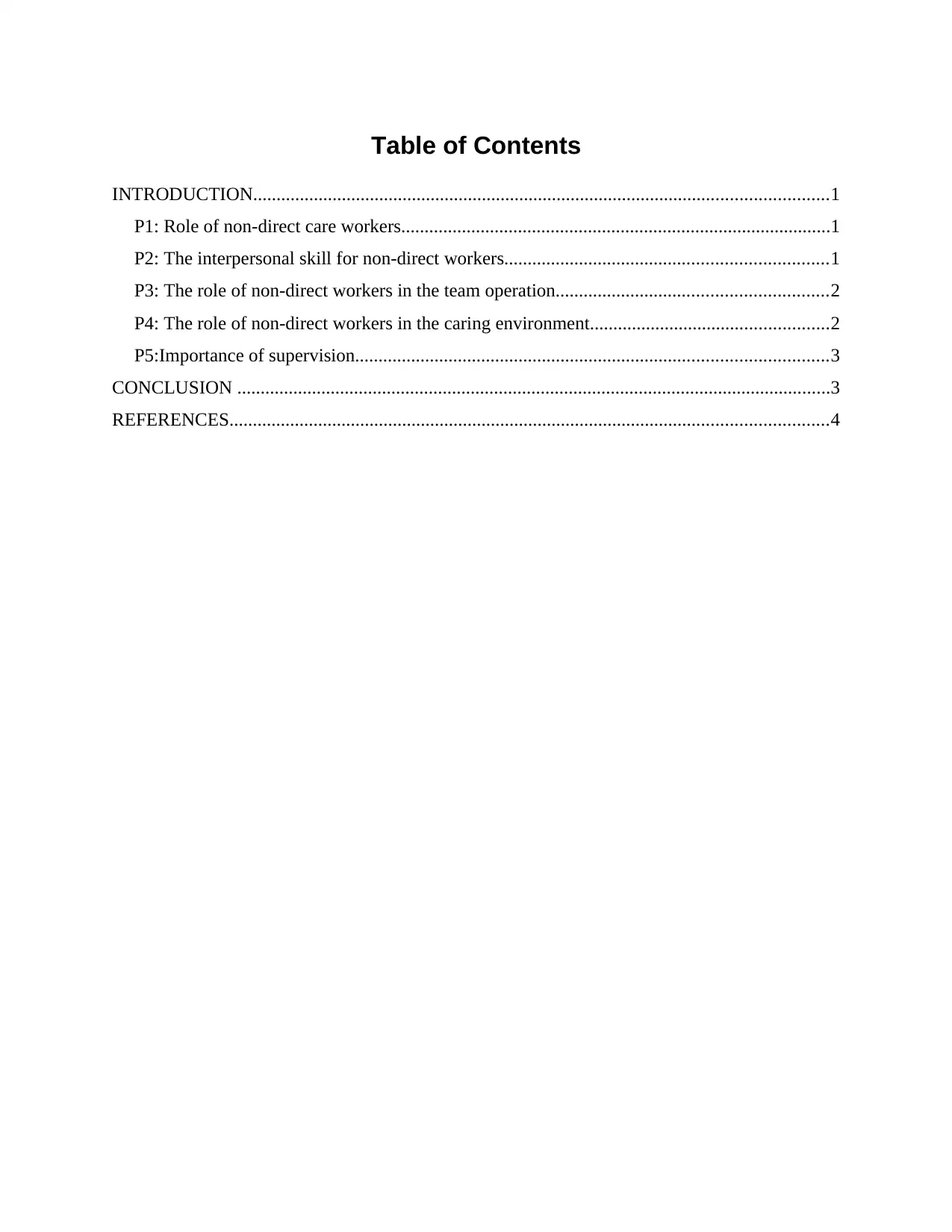
Table of Contents
INTRODUCTION...........................................................................................................................1
P1: Role of non-direct care workers............................................................................................1
P2: The interpersonal skill for non-direct workers.....................................................................1
P3: The role of non-direct workers in the team operation..........................................................2
P4: The role of non-direct workers in the caring environment...................................................2
P5:Importance of supervision.....................................................................................................3
CONCLUSION ...............................................................................................................................3
REFERENCES................................................................................................................................4
INTRODUCTION...........................................................................................................................1
P1: Role of non-direct care workers............................................................................................1
P2: The interpersonal skill for non-direct workers.....................................................................1
P3: The role of non-direct workers in the team operation..........................................................2
P4: The role of non-direct workers in the caring environment...................................................2
P5:Importance of supervision.....................................................................................................3
CONCLUSION ...............................................................................................................................3
REFERENCES................................................................................................................................4
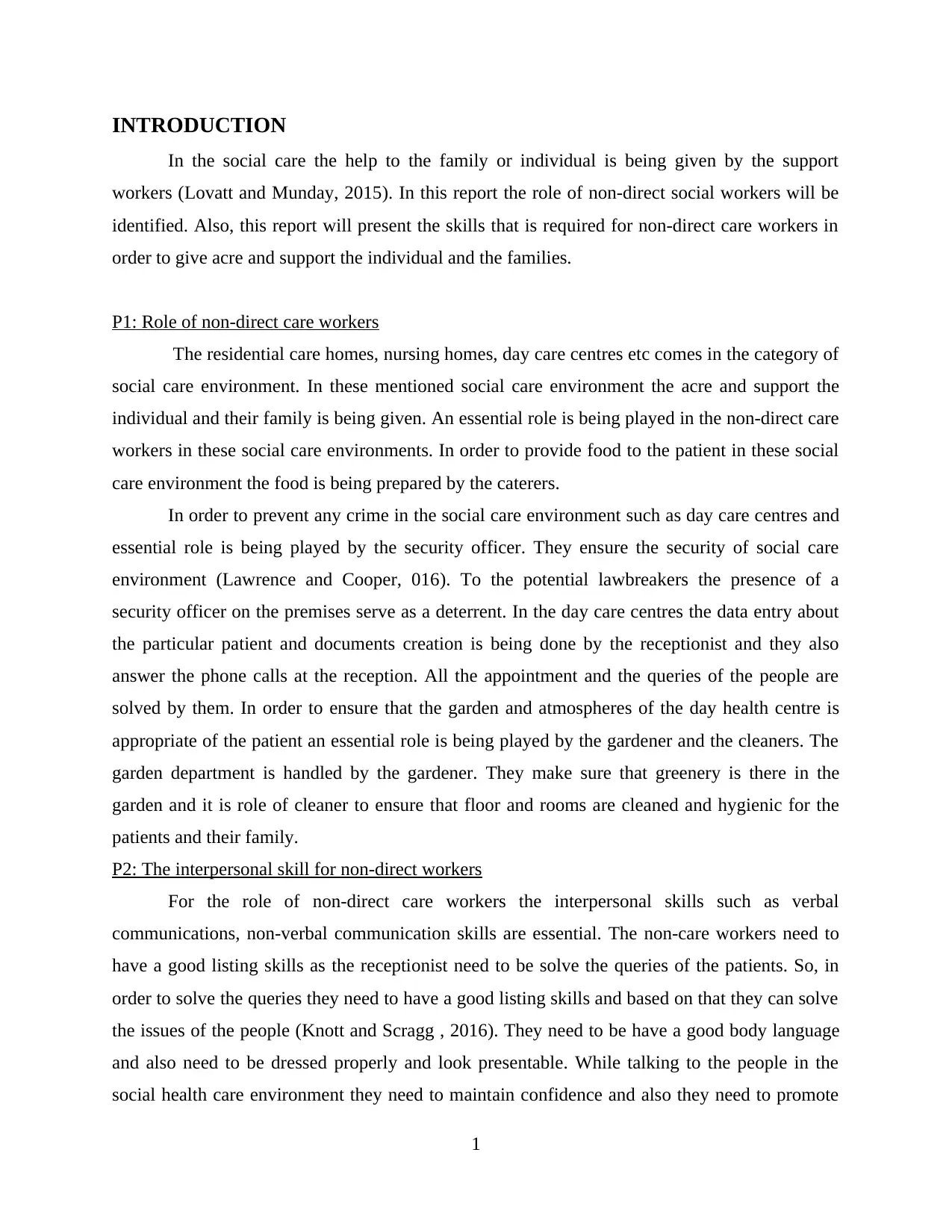
INTRODUCTION
In the social care the help to the family or individual is being given by the support
workers (Lovatt and Munday, 2015). In this report the role of non-direct social workers will be
identified. Also, this report will present the skills that is required for non-direct care workers in
order to give acre and support the individual and the families.
P1: Role of non-direct care workers
The residential care homes, nursing homes, day care centres etc comes in the category of
social care environment. In these mentioned social care environment the acre and support the
individual and their family is being given. An essential role is being played in the non-direct care
workers in these social care environments. In order to provide food to the patient in these social
care environment the food is being prepared by the caterers.
In order to prevent any crime in the social care environment such as day care centres and
essential role is being played by the security officer. They ensure the security of social care
environment (Lawrence and Cooper, 016). To the potential lawbreakers the presence of a
security officer on the premises serve as a deterrent. In the day care centres the data entry about
the particular patient and documents creation is being done by the receptionist and they also
answer the phone calls at the reception. All the appointment and the queries of the people are
solved by them. In order to ensure that the garden and atmospheres of the day health centre is
appropriate of the patient an essential role is being played by the gardener and the cleaners. The
garden department is handled by the gardener. They make sure that greenery is there in the
garden and it is role of cleaner to ensure that floor and rooms are cleaned and hygienic for the
patients and their family.
P2: The interpersonal skill for non-direct workers
For the role of non-direct care workers the interpersonal skills such as verbal
communications, non-verbal communication skills are essential. The non-care workers need to
have a good listing skills as the receptionist need to be solve the queries of the patients. So, in
order to solve the queries they need to have a good listing skills and based on that they can solve
the issues of the people (Knott and Scragg , 2016). They need to be have a good body language
and also need to be dressed properly and look presentable. While talking to the people in the
social health care environment they need to maintain confidence and also they need to promote
1
In the social care the help to the family or individual is being given by the support
workers (Lovatt and Munday, 2015). In this report the role of non-direct social workers will be
identified. Also, this report will present the skills that is required for non-direct care workers in
order to give acre and support the individual and the families.
P1: Role of non-direct care workers
The residential care homes, nursing homes, day care centres etc comes in the category of
social care environment. In these mentioned social care environment the acre and support the
individual and their family is being given. An essential role is being played in the non-direct care
workers in these social care environments. In order to provide food to the patient in these social
care environment the food is being prepared by the caterers.
In order to prevent any crime in the social care environment such as day care centres and
essential role is being played by the security officer. They ensure the security of social care
environment (Lawrence and Cooper, 016). To the potential lawbreakers the presence of a
security officer on the premises serve as a deterrent. In the day care centres the data entry about
the particular patient and documents creation is being done by the receptionist and they also
answer the phone calls at the reception. All the appointment and the queries of the people are
solved by them. In order to ensure that the garden and atmospheres of the day health centre is
appropriate of the patient an essential role is being played by the gardener and the cleaners. The
garden department is handled by the gardener. They make sure that greenery is there in the
garden and it is role of cleaner to ensure that floor and rooms are cleaned and hygienic for the
patients and their family.
P2: The interpersonal skill for non-direct workers
For the role of non-direct care workers the interpersonal skills such as verbal
communications, non-verbal communication skills are essential. The non-care workers need to
have a good listing skills as the receptionist need to be solve the queries of the patients. So, in
order to solve the queries they need to have a good listing skills and based on that they can solve
the issues of the people (Knott and Scragg , 2016). They need to be have a good body language
and also need to be dressed properly and look presentable. While talking to the people in the
social health care environment they need to maintain confidence and also they need to promote
1
⊘ This is a preview!⊘
Do you want full access?
Subscribe today to unlock all pages.

Trusted by 1+ million students worldwide
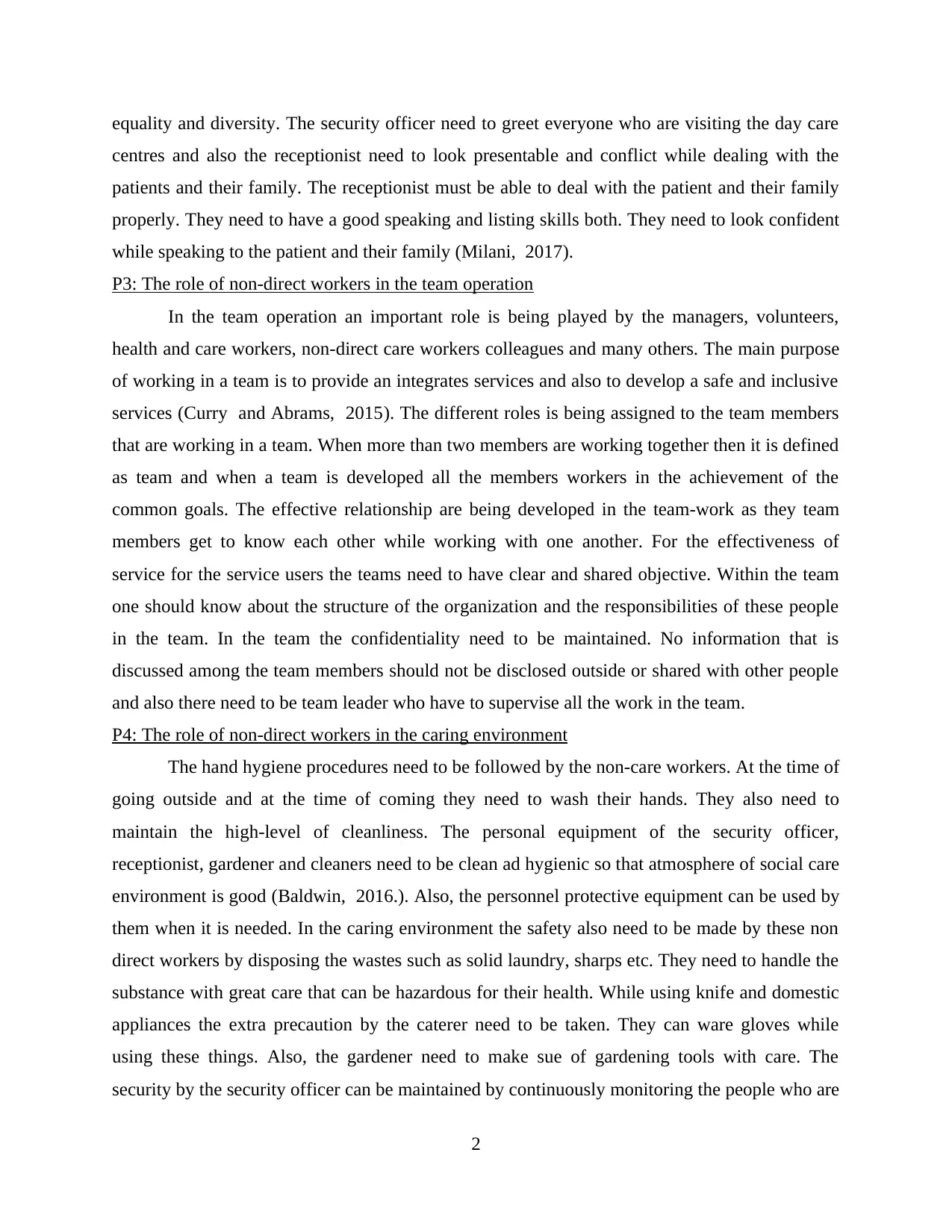
equality and diversity. The security officer need to greet everyone who are visiting the day care
centres and also the receptionist need to look presentable and conflict while dealing with the
patients and their family. The receptionist must be able to deal with the patient and their family
properly. They need to have a good speaking and listing skills both. They need to look confident
while speaking to the patient and their family (Milani, 2017).
P3: The role of non-direct workers in the team operation
In the team operation an important role is being played by the managers, volunteers,
health and care workers, non-direct care workers colleagues and many others. The main purpose
of working in a team is to provide an integrates services and also to develop a safe and inclusive
services (Curry and Abrams, 2015). The different roles is being assigned to the team members
that are working in a team. When more than two members are working together then it is defined
as team and when a team is developed all the members workers in the achievement of the
common goals. The effective relationship are being developed in the team-work as they team
members get to know each other while working with one another. For the effectiveness of
service for the service users the teams need to have clear and shared objective. Within the team
one should know about the structure of the organization and the responsibilities of these people
in the team. In the team the confidentiality need to be maintained. No information that is
discussed among the team members should not be disclosed outside or shared with other people
and also there need to be team leader who have to supervise all the work in the team.
P4: The role of non-direct workers in the caring environment
The hand hygiene procedures need to be followed by the non-care workers. At the time of
going outside and at the time of coming they need to wash their hands. They also need to
maintain the high-level of cleanliness. The personal equipment of the security officer,
receptionist, gardener and cleaners need to be clean ad hygienic so that atmosphere of social care
environment is good (Baldwin, 2016.). Also, the personnel protective equipment can be used by
them when it is needed. In the caring environment the safety also need to be made by these non
direct workers by disposing the wastes such as solid laundry, sharps etc. They need to handle the
substance with great care that can be hazardous for their health. While using knife and domestic
appliances the extra precaution by the caterer need to be taken. They can ware gloves while
using these things. Also, the gardener need to make sue of gardening tools with care. The
security by the security officer can be maintained by continuously monitoring the people who are
2
centres and also the receptionist need to look presentable and conflict while dealing with the
patients and their family. The receptionist must be able to deal with the patient and their family
properly. They need to have a good speaking and listing skills both. They need to look confident
while speaking to the patient and their family (Milani, 2017).
P3: The role of non-direct workers in the team operation
In the team operation an important role is being played by the managers, volunteers,
health and care workers, non-direct care workers colleagues and many others. The main purpose
of working in a team is to provide an integrates services and also to develop a safe and inclusive
services (Curry and Abrams, 2015). The different roles is being assigned to the team members
that are working in a team. When more than two members are working together then it is defined
as team and when a team is developed all the members workers in the achievement of the
common goals. The effective relationship are being developed in the team-work as they team
members get to know each other while working with one another. For the effectiveness of
service for the service users the teams need to have clear and shared objective. Within the team
one should know about the structure of the organization and the responsibilities of these people
in the team. In the team the confidentiality need to be maintained. No information that is
discussed among the team members should not be disclosed outside or shared with other people
and also there need to be team leader who have to supervise all the work in the team.
P4: The role of non-direct workers in the caring environment
The hand hygiene procedures need to be followed by the non-care workers. At the time of
going outside and at the time of coming they need to wash their hands. They also need to
maintain the high-level of cleanliness. The personal equipment of the security officer,
receptionist, gardener and cleaners need to be clean ad hygienic so that atmosphere of social care
environment is good (Baldwin, 2016.). Also, the personnel protective equipment can be used by
them when it is needed. In the caring environment the safety also need to be made by these non
direct workers by disposing the wastes such as solid laundry, sharps etc. They need to handle the
substance with great care that can be hazardous for their health. While using knife and domestic
appliances the extra precaution by the caterer need to be taken. They can ware gloves while
using these things. Also, the gardener need to make sue of gardening tools with care. The
security by the security officer can be maintained by continuously monitoring the people who are
2
Paraphrase This Document
Need a fresh take? Get an instant paraphrase of this document with our AI Paraphraser
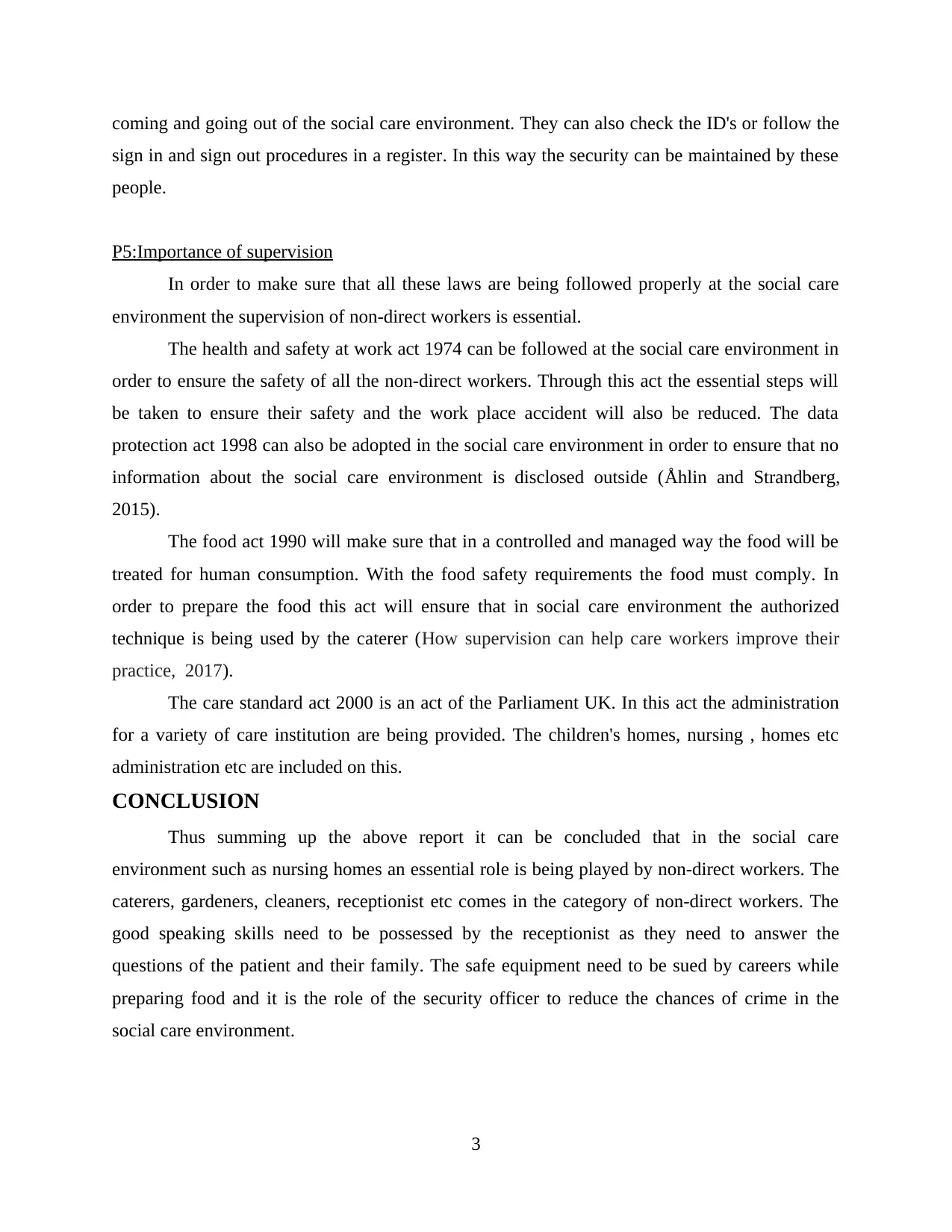
coming and going out of the social care environment. They can also check the ID's or follow the
sign in and sign out procedures in a register. In this way the security can be maintained by these
people.
P5:Importance of supervision
In order to make sure that all these laws are being followed properly at the social care
environment the supervision of non-direct workers is essential.
The health and safety at work act 1974 can be followed at the social care environment in
order to ensure the safety of all the non-direct workers. Through this act the essential steps will
be taken to ensure their safety and the work place accident will also be reduced. The data
protection act 1998 can also be adopted in the social care environment in order to ensure that no
information about the social care environment is disclosed outside (Åhlin and Strandberg,
2015).
The food act 1990 will make sure that in a controlled and managed way the food will be
treated for human consumption. With the food safety requirements the food must comply. In
order to prepare the food this act will ensure that in social care environment the authorized
technique is being used by the caterer (How supervision can help care workers improve their
practice, 2017).
The care standard act 2000 is an act of the Parliament UK. In this act the administration
for a variety of care institution are being provided. The children's homes, nursing , homes etc
administration etc are included on this.
CONCLUSION
Thus summing up the above report it can be concluded that in the social care
environment such as nursing homes an essential role is being played by non-direct workers. The
caterers, gardeners, cleaners, receptionist etc comes in the category of non-direct workers. The
good speaking skills need to be possessed by the receptionist as they need to answer the
questions of the patient and their family. The safe equipment need to be sued by careers while
preparing food and it is the role of the security officer to reduce the chances of crime in the
social care environment.
3
sign in and sign out procedures in a register. In this way the security can be maintained by these
people.
P5:Importance of supervision
In order to make sure that all these laws are being followed properly at the social care
environment the supervision of non-direct workers is essential.
The health and safety at work act 1974 can be followed at the social care environment in
order to ensure the safety of all the non-direct workers. Through this act the essential steps will
be taken to ensure their safety and the work place accident will also be reduced. The data
protection act 1998 can also be adopted in the social care environment in order to ensure that no
information about the social care environment is disclosed outside (Åhlin and Strandberg,
2015).
The food act 1990 will make sure that in a controlled and managed way the food will be
treated for human consumption. With the food safety requirements the food must comply. In
order to prepare the food this act will ensure that in social care environment the authorized
technique is being used by the caterer (How supervision can help care workers improve their
practice, 2017).
The care standard act 2000 is an act of the Parliament UK. In this act the administration
for a variety of care institution are being provided. The children's homes, nursing , homes etc
administration etc are included on this.
CONCLUSION
Thus summing up the above report it can be concluded that in the social care
environment such as nursing homes an essential role is being played by non-direct workers. The
caterers, gardeners, cleaners, receptionist etc comes in the category of non-direct workers. The
good speaking skills need to be possessed by the receptionist as they need to answer the
questions of the patient and their family. The safe equipment need to be sued by careers while
preparing food and it is the role of the security officer to reduce the chances of crime in the
social care environment.
3
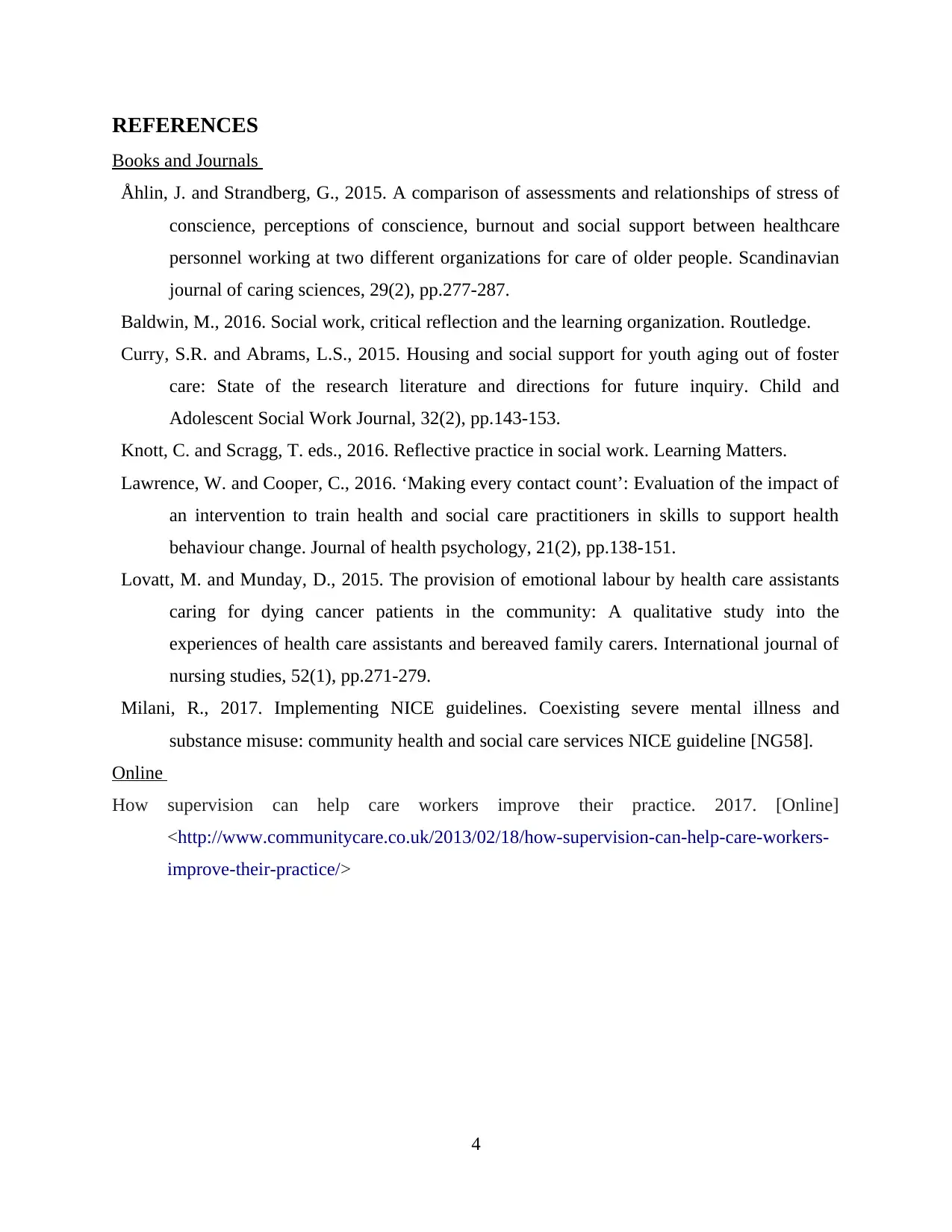
REFERENCES
Books and Journals
Åhlin, J. and Strandberg, G., 2015. A comparison of assessments and relationships of stress of
conscience, perceptions of conscience, burnout and social support between healthcare
personnel working at two different organizations for care of older people. Scandinavian
journal of caring sciences, 29(2), pp.277-287.
Baldwin, M., 2016. Social work, critical reflection and the learning organization. Routledge.
Curry, S.R. and Abrams, L.S., 2015. Housing and social support for youth aging out of foster
care: State of the research literature and directions for future inquiry. Child and
Adolescent Social Work Journal, 32(2), pp.143-153.
Knott, C. and Scragg, T. eds., 2016. Reflective practice in social work. Learning Matters.
Lawrence, W. and Cooper, C., 2016. ‘Making every contact count’: Evaluation of the impact of
an intervention to train health and social care practitioners in skills to support health
behaviour change. Journal of health psychology, 21(2), pp.138-151.
Lovatt, M. and Munday, D., 2015. The provision of emotional labour by health care assistants
caring for dying cancer patients in the community: A qualitative study into the
experiences of health care assistants and bereaved family carers. International journal of
nursing studies, 52(1), pp.271-279.
Milani, R., 2017. Implementing NICE guidelines. Coexisting severe mental illness and
substance misuse: community health and social care services NICE guideline [NG58].
Online
How supervision can help care workers improve their practice. 2017. [Online]
<http://www.communitycare.co.uk/2013/02/18/how-supervision-can-help-care-workers-
improve-their-practice/>
4
Books and Journals
Åhlin, J. and Strandberg, G., 2015. A comparison of assessments and relationships of stress of
conscience, perceptions of conscience, burnout and social support between healthcare
personnel working at two different organizations for care of older people. Scandinavian
journal of caring sciences, 29(2), pp.277-287.
Baldwin, M., 2016. Social work, critical reflection and the learning organization. Routledge.
Curry, S.R. and Abrams, L.S., 2015. Housing and social support for youth aging out of foster
care: State of the research literature and directions for future inquiry. Child and
Adolescent Social Work Journal, 32(2), pp.143-153.
Knott, C. and Scragg, T. eds., 2016. Reflective practice in social work. Learning Matters.
Lawrence, W. and Cooper, C., 2016. ‘Making every contact count’: Evaluation of the impact of
an intervention to train health and social care practitioners in skills to support health
behaviour change. Journal of health psychology, 21(2), pp.138-151.
Lovatt, M. and Munday, D., 2015. The provision of emotional labour by health care assistants
caring for dying cancer patients in the community: A qualitative study into the
experiences of health care assistants and bereaved family carers. International journal of
nursing studies, 52(1), pp.271-279.
Milani, R., 2017. Implementing NICE guidelines. Coexisting severe mental illness and
substance misuse: community health and social care services NICE guideline [NG58].
Online
How supervision can help care workers improve their practice. 2017. [Online]
<http://www.communitycare.co.uk/2013/02/18/how-supervision-can-help-care-workers-
improve-their-practice/>
4
⊘ This is a preview!⊘
Do you want full access?
Subscribe today to unlock all pages.

Trusted by 1+ million students worldwide
1 out of 6
Related Documents
Your All-in-One AI-Powered Toolkit for Academic Success.
+13062052269
info@desklib.com
Available 24*7 on WhatsApp / Email
![[object Object]](/_next/static/media/star-bottom.7253800d.svg)
Unlock your academic potential
Copyright © 2020–2026 A2Z Services. All Rights Reserved. Developed and managed by ZUCOL.





